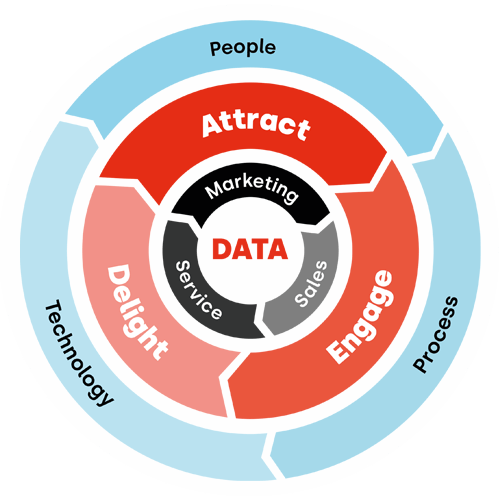It had been on the horizon for a while: the move from Universal Analytics (UA) to Google Analytics 4 (GA4). Google has announced that as of July 2023 Universal Analytics properties will no longer collect data. With the introduction of Google Analytics 4, the platform has taken a giant leap forward. Now, do you want to discover how Google Analytics 4 can contribute to your digital strategy? And better yet what the consequences are if you don't go along with this change. We'd like to tell you more about it in this blog.
What is GA4 and how does it differ from Universal Analytics?
What is the difference between GA4 and UA?
Google Analytics 4 (GA4) is the latest version of Google's analytics tool for websites and mobile apps. GA4 differs from Universal Analytics (UA) by using the event-based model. This model records specific actions taken by a user on the website or in the app, allowing for more accurate analysis of user behavior. In addition, GA4 uses machine learning technology and offers more options for integrating data from different platforms and devices, such as desktop, mobile and tablet. Finally, the "bounce rate" also disappears. For this, the engagement rate has been created. The engagement rate says more about the involvement of website visitors: Instead of looking at sessions where no interaction took place, it now looks at sessions where there is interaction. In short, GA4 is a powerful tool for analyzing user behavior and optimizing marketing activities.
Cookie Era
Since the tightening of the AVG legislation in 2018, certain search behavior and personal data collection is no longer allowed. This makes UA no longer future-proof when it comes to privacy laws. IP addresses are no longer stored and GA4 is increasingly using anonymous data, without the use of cookies.
With these changes, we are moving more and more into a cookie-less era, where machine learning techniques will provide more data enrichment. For example, predictions are given about dependent customers, sales, products and other important data. In addition, cross-channel/platform/device tracking is becoming increasingly important, meaning you'll get more insights into users across devices and platforms (desktop, mobile, tablet, etc).
What are the longer-term benefits of GA4?
What efforts are involved in the switch?
Switching from UA to GA4 may require some effort. This is due to the fact that GA4 uses a different approach to data collection and analysis compared to UA. Starting to measure visitors and conversions is the most important first step. Again, you need to make sure that data and conversions are coming into the platform. Reports from UA no longer work in GA4, so the reports have to be reset. Finally, you have to learn to understand the whole new structure of GA4.
What are the long-term benefits of GA4?
There are a number of long-term benefits that GA4 brings:
- Deeper insights into user behavior - Improved analytics features will give you deeper insights into user behavior. The new features provide opportunities for better segmentation, targeting specific groups of users and allowing for more precise analysis of interactions. It also maps the customer lifecycle and analyzes touchpoints to optimize the customer journey. Finally, GA4 uses an event-driven approach instead of sessions. This allows you to gather more detailed information about user interactions.
- Cross-device tracking - GA4 offers more cross-device tracking capabilities. This means you can see how users are using your websites or apps across devices, such as mobile devices, tablets and desktops. Cross-device tracking can help you receive a more complete picture of users and their behavior, such as when improving the data-driven attribution model (which measures which channels are contributing and what percentage) and when developing and optimizing remarketing campaigns.
- New features and capabilities - GA4 offers updated and new capabilities not available within UA. These new capabilities relate to more flexibility in defining goals, the ability to map certain custom events and the ability to apply machine learning to gain enhanced insights.
- Improved integration with Google Ads: GA4 is currently better integrated with Google Ads & Google Search Console compared to previous versions of Google Analytics. It gives you multiple opportunities to optimize campaigns and ads and retarget more effectively. All of which can lead to higher conversions. A numbers of improved retargeting capabilities are:
- Cross-platform retargeting;
- Machine learning retargeting;
- Targeting;
- Event-based retargeting.
What if you don't switch to GA4?
For you, it is important to use the right analytics tools to gain insight into website user behavior and marketing campaign effectiveness. Universal Analytics is currently the most widely used analytics tool to actually gain these insights from Web data. Due to the drafting of various privacy laws, not all data points may be stored and released anymore. For this reason, GA4 was created and UA is disappearing. If you don't switch to GA4 you will fall behind in the digital race. As of July 1, 2023, UA will no longer collect data. So this ensures, so to speak, that you will not receive any new data insights. Discussed below are some of the problems you may experience if you don't switch to GA4:
- Limited support: Given that UA is disappearing, UA also no longer offers support in terms of data analysis. This is a disadvantage for your business, as data-driven decision making can help your business grow significantly;
- New features: GA4 offers new features that UA does not, such as events based on advanced machine learning models and enhanced support for cross-device tracking (tracking users across multiple devices). By not switching to GA4, you're going to miss important opportunities in terms of obtaining user behavior and marketing efforts;
- Lack of future-proofing: As mentioned above, UA has been on the market for some time and will no longer be supported after July 1. By switching to GA4 now, you will be future-proof and ready for the changes and developments in web and data analytics;
- The loss of historical data: It is important to realize that GA4 has a completely new tracking code, which means that historical data from UA will not be automatically transferred. If you don't switch to GA4, you lose the ability to compare historical data with new insights and trends.
All in all, it is imperative to consider switching to GA4 to get the most out of your web analytics and be future-proofed. Only in this way can you be ahead of competition in the field of web analytics. While switching may require an extra effort, it can yield significant benefits in the long run.
Why should Hubspot users also use GA4?
As a HubSpot user, adding Google Analytics 4 (GA4) to your marketing stack can offer many benefits. Although HubSpot offers a comprehensive set of analytics tools, using GA4 is a great addition to your marketing strategy. Here are some reasons why HubSpot users should also use GA4:
- Deeper insights into visitor behavior: GA4 offers more comprehensive insights into your visitors' behavior than HubSpot Analytics;
- It gives you access to information about how visitors interact with your website, including clicks, scrolls, page views, conversions and more;
- Directly links Google products, such as Google Search Console, Looker, Google Ads and Google Optimize. Direct integration with other Google products allows data points to be more specific;
- Using multiple analytics tools gives you a more complete view of the data.
Need help setting up GA4?
Hopefully you've realized why it's necessary to switch from Universal Analytics to GA4. Be sure to make this switch before July 2023, but be smart and make the switch today.

Want to stay updated on all HubSpot changes? Subscribe to our newsletters, follow us on Instagram or join our HubSpot User Days!
Explore HubSpot User DaysShare this
You May Also Like
These Related Stories

From sales funnel to modern marketing flywheel: switch?
From WordPress to HubSpot CMS: improved quality of inbound leads

